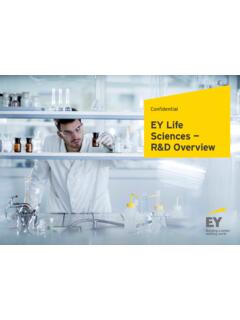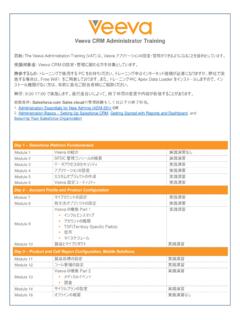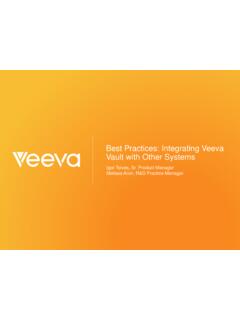Transcription of MSL Outlook - veeva.com
1 A V E EAVA. V EWHI. E VAT ERE. PAPO. PERT. R. MSL Outlook : What is the Future of Field Medical Affairs? V E E VA . C O M. A V E E VA WHI T E PA P E R. 2. Evolution of the MSL: New Skillsets and 2. Technology, Communication, and 4. Cross-functional Collaboration: Bridging the Gap Between Sales, Medical, and R& 5. Capturing Insights for Data-driven 6. Engagement 7. 8. V E E VA . C O M 1. A V E E VA WHI T E PA P E R. Introduction MSL Forum Participants By 2025, 75% of the global workforce will be comprised of millennials and in life sciences, the tipping point has already More than half of physicians Sanofi today are digital natives. 2 These healthcare providers (HCPs) have a new Outlook and worldview when it comes to treating patients: increasingly, they get AstraZeneca their information in new ways, and only a third of HCPs consider pharmaceutical Astellas companies to be a trusted source of The great exception to this is medical affairs, the bridge between the pharmaceutical industry and healthcare.
2 Alkermes Ipsen As medicine grows more complex and molecular, especially in specialty areas like oncology, HCPs are more and more reliant on medical affairs as a source of Lundbeck expertise and information. Medical science liaisons (MSLs) are a trusted source La Jolla Pharmaceuticals of information on complex drugs, and in many cases can serve as an integral Amicus part of delivering improved patient outcomes. And in rare diseases, where only a few HCPs may be specialized, MSLs are often a physician's top resource with a and more depth of knowledge on game-changing interventions. But, with increased prominence come greater demands, and so the MSL function must continue to evolve in order to best support new generation of HCPs with changing communication preferences, and a need for a deeper level of scientific exchange that incorporates trial data, outcomes information, and more.
3 The Veeva 2017 MSL Report, aggregating perspectives from leading companies collectively comprising more than 4000 MSLs worldwide, outlines the strategic Outlook of the function and how it is set to change, including both in terms of the MSL role and the organizational structures that underpin it. Medical affairs organizations will have a blueprint for developing a successful MSL of the future. Evolution of the MSL: New Skillsets and Training The number of MSLs was projected to grow by 20% in 2017,4 and their role has also expanded. Medical teams of all sizes report that life sciences leadership is more interested in their work, and how it can be quantified and expanded to become a more strategic component to organizational objectives. With the spotlight on medical affairs, it is an opportune time for redefining procedures and best practices that further medical's focus on scientific communication and patient outcomes.
4 While MSLs are seen as the scientific face of an organization, they may need additional training to ensure they are up-to-date on the latest developments in their field, and able to confidently engage in scientific discussions. MSL leaders are increasingly focused on hiring professionals with strong interpersonal engagement skills complemented with academic expertise. 1 Donston-Miller, Debra. Workforce 2020: What You Need to Know, Forbes, 2016. 2 Digitally native HCPs, PMLive, 2014. 3 Lau, Virginia. Study: One third of docs trust pharma content on HCP sites, Medical Marketing & Media, 2017. 4 8 Reasons MSL Opportunities Will Grow by 20% in 2017, Smith Hanley Associates LLC, 2016. V E E VA . C O M 2. A V E E VA WHI T E PA P E R. The increasing specialization of pipelines is also changing the remit of the MSL, opening new paths for the role. As customer engagement, experience, and framing scientific messages grow more complex, MSL managers are looking for a new profile.
5 This may include professionals with a level of commercial skills as well as expertise in communicating with multidisciplinary stakeholders. Driving outcomes means that direct patient experience can be an asset, especially in cases where an intervention may call for a specific profile of MSL. Considering interventions aligned to critical care or post-operative pain management, MSLs with a medical background in nursing may have direct experience in providing care, adding to their credibility. Emerging as a best practice related to the MSL, internal certifications are being used to ensure that MSLs are field-ready. The advent of scientific advancements in precision medicine, along with the pace of new research and data, mean that MSLs must be prepared to deliver scientific information in great detail, including current research, study results, and in some cases, economic data.
6 The success of an engagement can hinge on an MSL demonstrating familiarity with an HCP's latest research, or the ability to align study opportunities to clinical interests. In a complex, competitive landscape, ensuring MSLs are certified helps prepare them to have the rich, peer-to-peer scientific exchange HCPs need to improve outcomes. Further, creating the internal certification process helps MSLs gain more credibility with commercial colleagues, and enable a better organizational understanding of medical's core responsibilities. This move toward organizational credentialing mirrors the growing prevalence of external credentialing associations to qualify life sciences professionals. Although medical affairs enjoys greater access to HCPs than other branches of life sciences, increasingly, numerous accreditation services are emerging. None of these services are currently affiliated with the FDA, but MSLs are encountering the need for credentials at high-volume practices or top-ranking academic institutions.
7 Because these programs often require a terminal degree, however, the movement toward industry credentialing may impact hiring in the future. The MSL must evolve with the needs of healthcare stakeholders. CHANGING ROLE OF THE MSL. COMPANY. Past Present Future Primary care focus Specialty care/rare disease Biomarkers/genetic profiling Multiple major brands Smaller, multi-indications brands RWE. 1-2 launches per year Increased frequency of launches Increasing pressure to deliver against Mature market focus Emerging markets unmet need Highly segmented specialists COMPANY. Past Present Future HCP was the key stakeholder Payer/budget holder influence Broader spectrum of healthcare Traditional communications channels is increasing decision makers Competition: other branded agents Multichannel approach to communication Patient as influencer More complex science HEOR and RWE increasing complexity of choice V E E VA.
8 C O M 3. A V E E VA WHI T E PA P E R. Technology, Communication, and Content Beyond deep scientific expertise, the MSL must now become comfortable with an expanded set of technology solutions. While life sciences' preferred means of communication is face-to-face, a growing pool of HCPs prefers digital engagement that provides greater flexibility. In fact, 96% of HCPs surveyed report that they would benefit from attending more meetings, conferences, and trainings Medical teams also need to understand HCPs' new communication preferences and, on a macro level, use technology to address new market dynamics. Specialists focused on the management of rare disease populations comprise a highly discrete and geographically distributed group, making them difficult to reach face-to-face. Online meetings and events are becoming key ways to reach these HCPs and patients with the information they need in an effective real time manner.
9 Globally, new communication channels continue to impact the landscape of scientific engagement. For example, more than 490 million users in China are using WeChat one of the world's largest standalone messaging platforms including HCPs. Medical teams need to build these channels into their engagement To meet HCP needs for instant responses, some organizations are building on the concept of the real time MSL with a twist. Alkermes plans to employ an on-demand portal to answer immediate questions, staffing it with medical information representatives and medical science liaisons. We find that our medical information team knows these responses inside out, said Scott McConnell, senior director of medical affairs at Alkermes. And MSLs have deep, trusted HCP relationships and honed engagement skills. By partnering our MSLs with their medical information counterparts, we can ensure that HCPs always get the information they need, immediately.
10 Despite the advent of new channels and technology, for many organizations, the delivery of HCP-facing scientific information via the MSL is limited to PowerPoint slides. These slide libraries typically consist of hundreds of presentations that in turn include hundreds of slides, which can be difficult to use and navigate. Organizations should consider building a more robust and granular centralized content library accessible to all medical teams, tagged to improve access when creating bespoke presentations or answering an unanticipated question with ease. Given the time and resource investment associated with content creation, MSLs and medical information teams can partner to create a streamlined set of content that delivers more precise messaging, and is utilized to the fullest extent. One biopharmaceutical company is taking the approach of creating succinct reactive decks based on frequently asked questions that MSLs can refer to easily, avoiding the need to present as much during a compressed HCP meeting.





